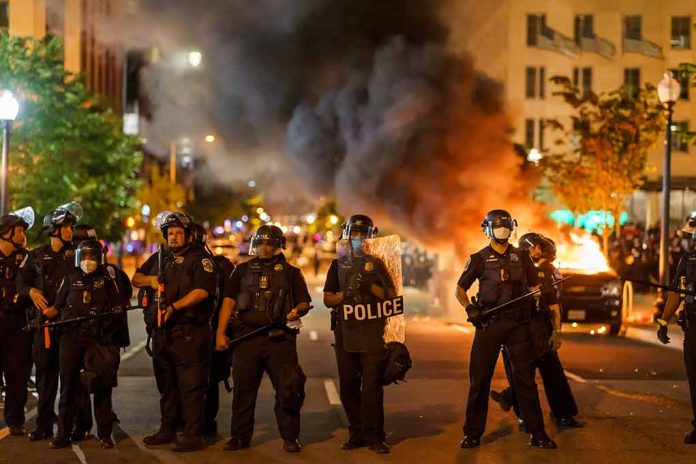
The tragic death of Jayland Walker, a 25-year-old Black man, by Akron police has reignited discussions on police reform across the nation.
At a Glance
- Social justice activists in Akron demand police reforms after a grand jury declined to indict the officers involved in the Walker shooting.
- Walker was shot 46 times by police officers, sparking protests and outcries for justice and policy changes.
- Despite no indictments, Walker’s family received a $4.8 million settlement and continues to push for a federal investigation.
- The incident prompts Akron to revise its vehicle pursuit policies, prohibiting chases for equipment violations.
Seeking Justice and Reform
Social justice activists in Akron have called for police reforms following the grand jury’s decision not to indict the officers involved in the Jayland Walker shooting. Walker was shot 46 times by police after a traffic stop escalated, leading to mass protests and a citywide curfew last summer. The absence of indictments has prompted Walker’s family and local leaders to request a U.S. Justice Department investigation into the Akron Police Department.
Ohio Attorney General stated that Walker fired at officers and reached for his waistband, which officers perceived as a threat. Walker’s family attorney, Bobby DiCello, disputes this portrayal, emphasizing Walker’s non-criminal background. DiCello also underscored that Walker was grieving his fiancée’s death, noted by investigators who found searches related to suicide in his online history.
The Aftermath and Legal Standoff
The state attorney general’s office cited no direct evidence of Walker being suicidal, and DiCello contends Walker’s distress did not justify the aggressive police response. Following the shooting, Walker’s family filed a federal lawsuit accusing Akron’s police department of excessive force and harboring a culture of violence and racism. In lieu of indictments, Walker’s family will receive a $4.8 million settlement from the city. Attorney DiCello stated, “There’s more to the settlement than money. The family accomplished meaningful policy changes with its litigation efforts.”
The city has announced policy revisions, notably changes to its vehicle pursuit policy that now prohibits chases for equipment violations. The eight officers involved, initially placed on leave, have since been reinstated to active duty. Walker’s family attorneys continue to criticize the state investigation as biased and challenge claims that Walker aimed his gun at officers.
Community Response and Future Implications
The shooting of Walker catalyzed calls for enhanced police reform and community relations improvement. Walker’s family’s demands for justice and transparency are echoed by protestors, including his mother and sister, who join demonstrations carrying Black Lives Matter flags and “Justice for Jayland” signs. Activists like Tamika Mallory have highlighted the egregious nature of firing nearly 100 shots, stating, “That is not humane. It is not right. It is something we must challenge.”
This tragedy underscores the urgent need for meaningful dialogue and reform within law enforcement agencies. Policymakers and community leaders must collaborate to cultivate effective, equitable, and accountable law enforcement practices that foster positive interactions with the diverse communities they serve.
Sources:
Social justice activists demand police reform after Jayland Walker decision
Akron to Pay $4.8M to Family of Black Man Killed by Police
Akron to pay $4.8 million to Jayland Walker’s family over police shooting













